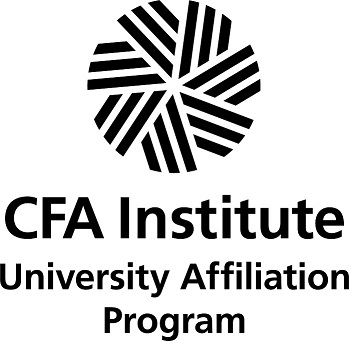
I-Chen Lu
Senior Lecturer in Finance
Faculty of Business and Law
DiscoverGet in touch with us as we may be able to offer you a place for September 2024 through Clearing.
UCAS Code
N300
Level
UndergraduateUG
BSc (Hons)Duration
Full Time: 3 Years
Part Time: 4 - 6 Years
Starting
September
BCC at A Level
DMM at BTEC
UK Fees 24/25
Full Time: £9,250
Part Time: £1,540 (per 20 credit module)
International Fees 24/25
Full Time: £15,200
Location
For questions regarding study and admissions please contact us:
study@northampton.ac.uk
0300 303 2772
BSc Finance at the University of Northampton provides you with the essential and advanced analytical skills necessary for professional careers in banking, asset management and financial research. You will examine core concepts in economics, financial analysis, security valuation, portfolio theory and risk management with a strong focus on decision-making in line with regulatory, ethical and sustainability standards.
UON has invested significantly in database resources to give you access to live and historical financial data for developing employability skills whilst studying this finance degree. Throughout this programme, Bloomberg, Thomson Reuters terminals, Financial Times, MarketLine, and Orbis will be used to enhance your learning experience by implementing theories into practice with real-world scenarios.
Professional Body: Chartered Financial Analysts (CFA) Institute
Updated 03/07/2024






The University of Northampton’s BSc Finance degree programme is ideal for those who intend to work in the investment management profession and obtain a professional financial designation with well-known investment credentials. This specialist university finance course will equip you with the strong theoretical and technical skills required for the highlighted career paths and professional finance accreditations.
In addition, teaching on this Finance degree will be enriched by the latest research in finance that is linked strongly with practitioner application of concepts, including corporate responsibility, regulation, and policy-guiding practice.
BSc Finance provides you with the rigorous and essential financial, quantitative and analytical skills necessary for professional careers in banking, asset management and financial research. You will examine core concepts in economics, financial analysis, security valuation, portfolio theory and risk management. There is a strong focus on decision-making in line with regulatory, ethical and sustainability standards.
Throughout this finance university degree, Bloomberg and Thomson Reuters terminals will be used to enhance your learning experience by implementing theories into practice with real-world scenarios.
If you meet the entry criteria, and choose to take an accounting and finance placement year, you will find it an invaluable experience that helps you to apply your learning in your final year and prepares you for your career in finance. The University of Northampton offers support in helping you to find a placement, which can be in the UK or overseas.
The Faculty of Business and Law have a dedicated Placements team who will support you through the process of taking a placement year. You can follow the Faculty of Business and Law Placements Team to hear more about their services.
Please note the modules shown here relate to the academic year 24/25. The modules relating to the academic year 25/26 will be available from June 2025.
In the first year, you will be allocated a personal tutor, a member of the academic staff, who provides academic guidance and support through the course. During the first year of study, you will complete six compulsory introductory Finance BSc modules, that provide an essential foundation in accounting, finance and economics as well as necessary numerical and academic skills.
In the second year, you will build your knowledge on the foundation of the previous year by taking six compulsory specialist modules. At this stage, you will be introduced to a range of finance subfields, including investment, ethical and professional standards, and risk management.
In the final year, you will gain in-depth knowledge by studying the more specialist areas of investment. You will take four compulsory modules and up to two designated modules. You can tailor your studies to reflect your areas of expertise and specialisms at this stage by selecting from a range of designated modules in areas such as economics, international finance, and risk management.
A typical offer for this BSc Finance degree would be:
We welcome applications from students with a mix of A levels and BTEC/Cambridge Technical qualifications.
You will also require a GCSE in Maths at grade C / 4 or above.
For information on how to apply to study with us, please see our How to Apply page.
All International and EU students applying for a course with the University of Northampton must meet the following minimum English language requirements:
For information regarding English language requirements at the University, please see our IELTS page.
Fees quoted relate to study in the Academic Year 2024/25 only and may be subject to inflationary increases in future years.
For information on the scholarships available to you, please see our scholarships page.
For more information about possible funding options, please visit our Fees and Funding pages.
There are no additional costs for the BSc Finance course for students beginning their studies in September 2024. Should this change, applicants and students will be contacted by the university with details of the costs.
Fees quoted relate to study in the Academic Year 23/24 only and may be subject to inflationary increases in future years.
Our programme is a member of the Chartered Financial Analysts (CFA) Affiliation Programme and aligned to key investment and risk management professional qualifications. We cover more than 70% of the CFA Program Candidate Body of Knowledge (CBOK), which provides excellent preparation for you to pursue an international career in the finance industry. During your study with UON, you will benefit from free access to the CFA learning resources, including industrial webinars and exam review study guides. In addition, our final year students with outstanding academic performance can be awarded CFA Program Student Scholarships, after graduation.

At the University of Northampton, everything we do, from funded trips to paid internships, is to give you everything you need to make a difference when you leave.
If you join our full-time BSc Finance degree at the University of Northampton, you will receive a laptop when your course begins*. The laptops are built to a bespoke custom specification ideal for use in the seminar room, collaborative group work or studying at home.
Whatever your ambitions, we’re here to help you to achieve them. We’ll support you to identify the skills you’re learning during your finance course, find your strengths and secure practical experience so that when it comes to applying for jobs or further study you’ll feel confident in standing out from the crowd. We’ve created the Northampton Employment Promise because we are so confident that if you focus on your studies and complete one of our awards you’ll be highly employable by the time you graduate. Putting you in a great position to secure employment or continue your studies.
To check out the full list of perks, visit our Student Perks page or dedicated International Perks page.
*UK fee payers only (see Terms and Conditions for further details).
Assessment will be a mix of case-based reports, essays, examinations, group activities, presentations, and a research project. The Finance degree combines the rigour and validity of the examination process with the opportunity for you to demonstrate achievement of learning outcomes by conducting in-depth research. You will prepare and submit a final year project.
Yes, our BSc Finance degree uses the Bloomberg Finance Lab, which includes Bloomberg and Thomson Reuters terminals. These are used to enhance your learning experience by implementing theories into practice with real-world scenarios.
Your assessments will be a mix of case-based reports, essays, examinations, group activities, presentations, and a research project. The programme combines the rigour and validity of the examination process with the opportunity for you to demonstrate achievement of learning outcomes by conducting in-depth research. In Year 3, you will prepare and submit a final year project.
The Student Experience Support Team are a team of previous graduates of the University of Northampton, they are here to support all Faculty of Business and Law students by offering a friendly listening ear and ensuring students are aware of the numerous support systems that the University has to offer. The team provide confidential 1-1 meetings in person and online where they will signpost the students to the relevant support teams to ensure they are aware of the support available for them throughout their studies. You can follow the Student Experience Support Team to see the services they offer.
Open Days give you the best experience and insight to courses, people and facilities that interest you. Make your choice easier and come meet us.
Senior Lecturer in Governance & Finance
Finance BSc (Hons)
DiscoverLecturer in Accounting
Finance BSc (Hons)
DiscoverGraduates with a BSc finance university degree have many options for a career, including:
Brokers and Traders, Compliance Managers, Financial Advisors, Financial Sales and Client service professionals, Financial Analysts, Financial Planners and Consultants, Fund Managers, Investment Bankers and Researchers, Investment Consultants and Strategists, Pension Specialists, Portfolio and Wealth Managers, Project and Programme Risk Managers, Regulatory Consultants, Risk Analysts, Risk Specialists.
On successful completion of your BSc Finance degree, you will have the opportunity to further your education and knowledge by studying one of the University of Northampton’s master’s degrees. Benefit from our 20% alumni discount on postgraduate fees to give you a CV that will catch the eye of employers.
Some of our industry-relevant master’s degrees are:
Our postgraduate courses are a great way to enhance the skills you have already learnt. Benefit from our 20% alumni discount on postgraduate fees to give you a CV that will catch the eye of employers.
Discover the facilities that you will use if you study a BSc (Hons) Finance course with us. One of our bespoke facilities includes the the Bloomberg Finance Lab, where you have access to specialist analytical computer equipment.

Accounting and Finance BSc provides you with the skills and knowledge to take on any role within this field of work after graduation.

